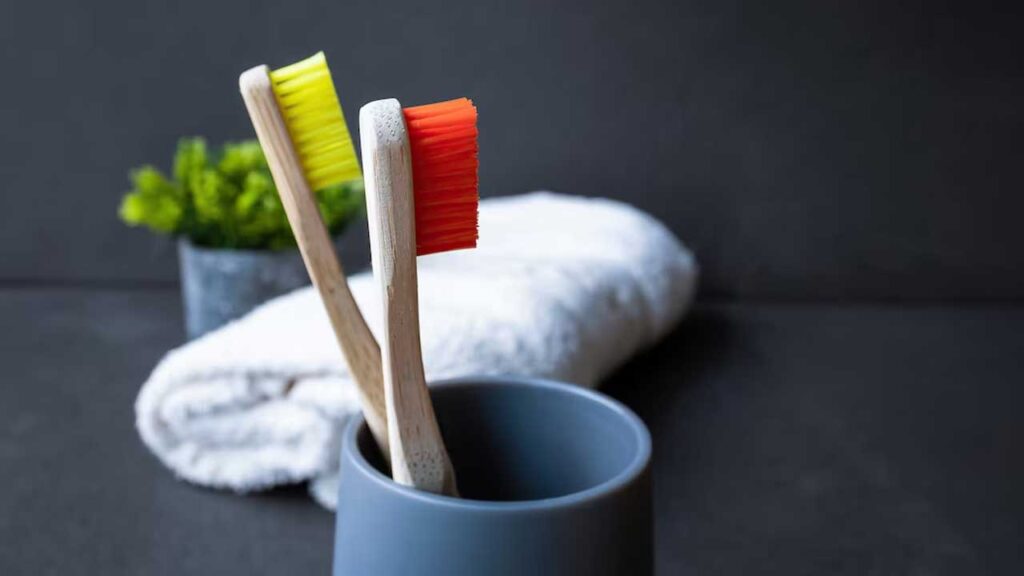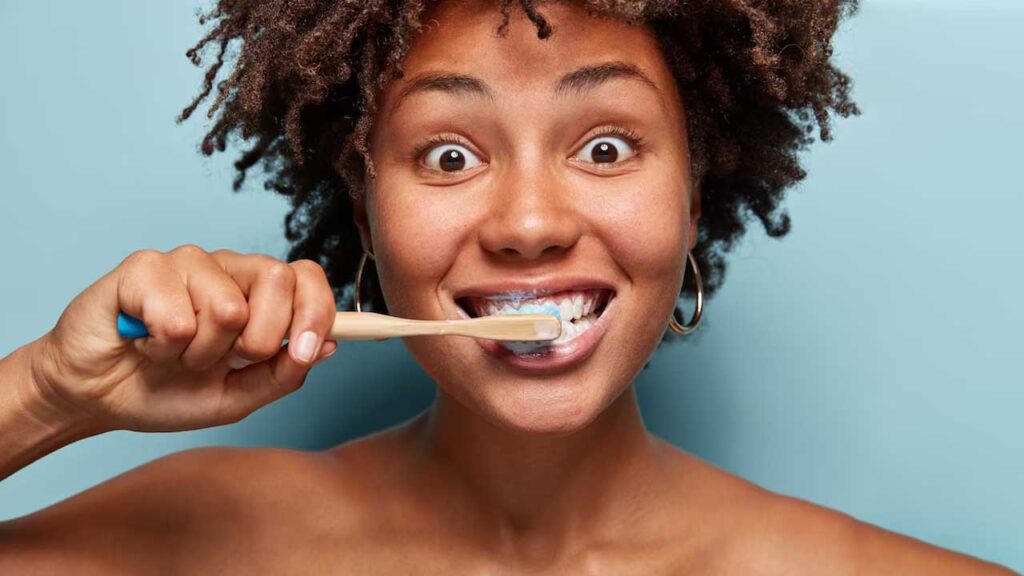Bamboo toothbrushes are becoming more popular as people look for ways to reduce their plastic consumption and environmental impact. But what exactly is a bamboo toothbrush and why is it environmentally friendly?
In this article, we will answer these questions and more. We will also give you some tips on how to choose and use a bamboo toothbrush, as well as some of the benefits and drawbacks of this eco-friendly alternative.
What is a bamboo toothbrush?
A bamboo toothbrush is a manual toothbrush that has a long handle made from bamboo and bristles made from nylon or other materials. Bamboo is a fast-growing plant that belongs to the grass family. It is native to Asia, but can grow in many parts of the world. Bamboo is considered a renewable and sustainable resource because it can regrow from its roots after being harvested.

Bamboo toothbrushes are not a new invention. In fact, they are one of the oldest types of toothbrushes in history. The first toothbrushes were made in China around 3,000 years ago using bamboo and other natural materials, such as animal hair or plant fibers. Today, bamboo toothbrushes use modern technology and design to improve their performance and durability.
Why is a bamboo toothbrush environmentally friendly?
A bamboo toothbrush is environmentally friendly for several reasons:
- It reduces plastic waste. Plastic toothbrushes are one of the most common items found in landfills and oceans. According to the World Wildlife Fund, about 4.7 billion plastic toothbrushes are thrown away every year globally. Plastic toothbrushes are not biodegradable and can take hundreds of years to decompose. They can also release harmful chemicals into the environment and harm wildlife. A bamboo toothbrush, on the other hand, can be composted or recycled after removing the bristles. The bamboo handle can break down naturally within a few months or years, depending on the conditions.
- It saves energy and resources. Bamboo toothbrushes require less energy and resources to produce than plastic toothbrushes. Bamboo grows faster than most trees and does not need fertilizers or pesticides to thrive. It also absorbs more carbon dioxide and produces more oxygen than most plants. Plastic toothbrushes, on the other hand, are made from petroleum, a non-renewable fossil fuel that contributes to greenhouse gas emissions and climate change. Plastic toothbrushes also require more water and chemicals to manufacture and transport than bamboo toothbrushes.
- It supports local communities. Bamboo toothbrushes can provide income and employment opportunities for local farmers and artisans who grow and craft them. Many bamboo toothbrush brands are committed to fair trade and social responsibility practices that ensure fair wages and working conditions for their suppliers. Plastic toothbrushes, on the other hand, are often mass-produced in factories that may exploit workers and harm the environment.
How to choose a bamboo toothbrush?
There are many bamboo toothbrush brands and models available on the market today. Here are some factors to consider when choosing a bamboo toothbrush:
- The size and shape of the handle. The handle should fit comfortably in your hand and allow you to reach all areas of your mouth easily. Some handles may have curves or grooves to improve grip and ergonomics.
- The type and color of the bristles. The bristles should be soft or medium-soft to avoid damaging your enamel or gums. Some bristles may be infused with charcoal or other natural substances to enhance their cleaning or whitening properties. Some bristles may also have different colors or patterns to distinguish them from other users or indicate when they need to be replaced.
- The packaging and certification of the product. The packaging should be minimal and eco-friendly, preferably made from recycled or compostable materials. The product should also have certification or verification from reputable organizations that confirm its quality, safety, and sustainability standards.
How to use a bamboo toothbrush?
Using a bamboo toothbrush is similar to using a regular toothbrush. Here are some tips on how to use a bamboo toothbrush:
- Wet your bristles with water before applying your toothpaste.
- Brush your teeth gently for two minutes, twice a day, using circular motions.
- Rinse your mouth and your toothbrush thoroughly after each use.
- Store your toothbrush in a dry place, away from moisture or direct sunlight.
- Replace your toothbrush every three months or when the bristles become frayed or worn out.
- Dispose of your toothbrush responsibly by removing the bristles with pliers or scissors and composting or recycling the handle.
What are the benefits and drawbacks of a bamboo toothbrush?
A bamboo toothbrush has both benefits and drawbacks that you should weigh before making your decision. Here are some of the pros and cons of a bamboo toothbrush:
Benefits
- A bamboo toothbrush can help you reduce your plastic waste and environmental impact.
- A bamboo toothbrush can save you money in the long run by avoiding the need for repeated purchases of plastic toothbrushes.
- A bamboo toothbrush can improve your oral health by preventing bacterial growth and plaque buildup on the handle and the bristles.
- A bamboo toothbrush can enhance your aesthetic appeal by giving you a natural and minimalist look.
Drawbacks
- A bamboo toothbrush may not be as durable or hygienic as a plastic toothbrush. It may crack, splinter, or mold over time if not properly cared for.
- A bamboo toothbrush may not be as effective or comfortable as a plastic toothbrush. It may have fewer features or options to suit your personal preferences or needs.
- A bamboo toothbrush may not be as accessible or affordable as a plastic toothbrush. It may be harder to find in local stores or online, and it may cost more upfront than a plastic toothbrush.
FAQs
Here are some frequently asked questions about bamboo toothbrushes:
Are bamboo toothbrushes vegan?
Most bamboo toothbrushes are vegan, meaning they do not contain any animal-derived ingredients or products. However, some bamboo toothbrushes may use boar hair or other animal hair for the bristles, which are not vegan. If you are looking for a vegan bamboo toothbrush, make sure to check the label or the website of the brand to confirm the material of the bristles.
Are bamboo toothbrushes antibacterial?
Bamboo toothbrushes are naturally antibacterial, meaning they can inhibit the growth of bacteria on the handle and the bristles. Bamboo has antimicrobial properties that can kill or prevent the spread of harmful microorganisms. However, this does not mean that bamboo toothbrushes are completely germ-free or immune to contamination. You still need to clean and store your bamboo toothbrush properly to avoid any oral health issues.
How do I clean my bamboo toothbrush?
You can clean your bamboo toothbrush by rinsing it with water after each use and letting it air dry in a well-ventilated area. You can also sanitize your bamboo toothbrush by soaking it in a solution of vinegar and water for 20 minutes once a week. You can also use hydrogen peroxide, baking soda, or salt as natural disinfectants. Do not use harsh chemicals or bleach to clean your bamboo toothbrush as they may damage the material or cause adverse reactions.
A bamboo toothbrush is a manual toothbrush that has a long handle made from bamboo and bristles made from nylon or other materials. A bamboo toothbrush is environmentally friendly because it reduces plastic waste, saves energy and resources, and supports local communities. A bamboo toothbrush can also be good for your teeth if you choose and use it correctly. However, a bamboo toothbrush also has some drawbacks that you should consider before switching from a plastic toothbrush.
We hope this article has helped you understand what is a bamboo toothbrush and why is it environmentally friendly. If you have any questions or comments, please feel free to share them below.


1 thought on “What is a Bamboo Toothbrush? Why is it Environmentally Friendly?”